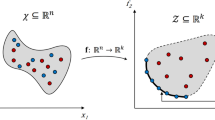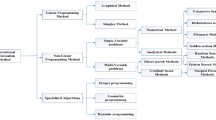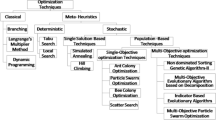Abstract
The focal problem for centralized multisensor multitarget tracking is the data association problem of partitioning the observations into tracks and false alarms so that an accurate estimate of the true tracks can be recovered. Large classes of these association problems can be formulated as multidimensional assignment problems, which are known to be NP-hard for three dimensions or more. The assignment problems that result from tracking are large scale, sparse and noisy. Solution methods must execute in real-time. The Greedy Randomized Adaptive Local Search Procedure (GRASP) has proven highly effective for solving many classes NP-hard optimization problems. This paper introduces four GRASP implementations for the multidimensional assignment problem, which are combinations of two constructive methods (randomized reduced cost greedy and randomized max regret) and two local search methods (two-assignment-exchange and variable depth exchange). Numerical results are shown for a two random problem classes and one tracking problem class.
Similar content being viewed by others
References
E. Balas and M. Saltzman, “An algorithm for the three-index assignment problem,” Operations Research, vol. 39, no. 1, pp. 150–161, 1991.
H. Bandelt, Y. Crama, and F. Spieksma, “Approximation algorithms for multi-dimensional assignment problems with decomposable costs,” Discrete Applied Mathematics, vol. 49, no. 1, pp. 25–50, 1994.
Y. Bar-Shalom (Ed.), Multitarget-Multisensor Tracking: Advanced Applications, Artech House: Dedham, MA, 1990.
Y. Bar-Shalom and T. Fortmann, Tracking and Data Association, Academic Press: Boston, MA, 1988.
D. Bertsekas, Linear Network Optimization, MIT Press: Cambridge, MA, 1991.
S. Blackman, Multiple Target Tracking with Radar Applications, Artech House: Dedham, MA, 1986.
Y. Crama and F. Spieksma, “Approximation algorithms for three-dimensional assignment problems with triangle inequalities,” European Journal of Operational Research, vol. 60, no. 1, pp. 273–279, 1992.
S. Deb, K. Pattipati, and Y. Bar-Shalom, “A S-dimensional assignment algorithm for track initiation,” in Proceedings of the IEEE Systems Conference, Kobe, Japan, Sept. 1992, pp. 127–130.
S. Deb, K. Pattipati, and Y. Bar-Shalom, “A multisensor-multitarget data association algorithm for hetereogeneous sensors,” IEEE Transactions on Aerospace and Electronic Systems, vol. 29, no. 2, pp. 560–568, 1993.
S. Deb, K. Pattipati, Y. Bar-Shalom, and H. Tsanakis, “A new algorithm for the generalized multidimensional assignment problem,” in Proceedings of the IEEE International Conference on Systems, Man, and Cybernetics, Chicago, 1992.
T. Feo and J. Bard, “Flight scheduling and maintenance base planning,” Management Science, vol. 35, no.12, pp. 1415–1432, 1989.
T. Feo, M. Resende, and S. Smith, “Agreedy randomized adaptive search procedure for maximum independent set,” Operations Research, vol.42, no. 5, pp. 860–878, 1994.
A. Frieze and J. Yadegar, ”An algorithm for solving 3-dimensional assignment problems with application to scheduling a teaching practice,” Journal of the Operational Research Society, vol. 32, pp. 989–995, 1981.
M. Garey and D. Johnson, Computers and Intractability, A Guide to NP completeness, W.H. Freeman and Company: San Fransico, CA, 1979.
P. Hansen and L. Kaufman, “A primal-dual algorithm for the three-dimensional assignment problem,” Cahiers du Centre di Recherche Operational, vol. 15, pp. 327–336, 1973.
F. Hillier and J. Lieberman, Introduction to Operations Research, Holden-Day: San Francisco, CA, 1986.
Y. Li, P. Pardalos, and M. Resende, “A greedy randomized adaptive search procedure for the quadratic assignment problem,” DIMACS Series in Discrete Mathematics, vol. 16, pp. 237–261, 1994.
S. Lin and B. Kernighan, “An effective heuristic algorithm for the traveling salesman problem,” Operations Research, vol.21, pp. 498–516, 1973.
C. Morefield, “Application of 0-1 Integer programming to multitarget tracking problems,” IEEE Transactions on Automatic Control, vol. 22, no. 3, pp. 302–312, 1977.
R. Murphey, P. Pardalos, and L. Pitsoulis, “A GRASP for the multi-target multi-sensor tracking problem,” Networks, Discrete Mathematics and Theoretical Computer Science Series, American Mathematical Society, vol. 40, pp. 277–302, 1998.
R. Murphey, P. Pardalos, and L. Pitsoulis, “Aparallel GRASP for the data association multidimensional assignment problem,” Parallel Processing of Discrete Problems, IMA Volumes in Mathematics and its Applications, Springer-Verlag, vol. 106, pp. 159–180, 1998.
G. Nemhauser and L.A. Wolsey, Integer and Combinatorial Optimization, Wiley: New York, NY, 1988.
C. Papadimitriou and K. Steiglitz, Combinatorial Optimization: Algorithms and Complexity, Prentice-Hall, Inc.: Englewood Cliffs, NJ, 1982.
K. Pattipati, S. Deb, Y. Bar-Shalom, and R. Washburn, “Passive multisensor data association using a new relaxation algorithm,” in Multitarget-Multisensor Tracking: Advanced Applications, Y. Bar-Shalom (Ed.), Artech House: Dedham, MA, 1991.
J. Pierce and J. Lasky, “Improved combinatorial programming algorithms for a class of all-zero-one integer programming problems,” Management Science, vol. 19, pp. 529–543, 1973.
W. Pierskalla, “The tri-substitution method for the three-dimensional assignment problem,” Journal du CORS, vol.5, pp. 71–81, 1967.
W. Pierskalla, “The multidimensional assignment problem,” Operations Research, vol. 16, pp. 422–431, 1968.
A. Poore, “Multidimensional assignment formulation of data association problems arising from multitarget tracking and multisensor data fusion,” Computational Optimization and Applications, vol.3, pp. 27–57, 1994.
A. Poore, “Multidimensional assignments and multitarget tracking,” in Partitioning Data Sets, I. Cox, P. Hansen, and B. Julesz (Eds.), DIMACS Series in Discrete Mathematics and Theoretical Computer Science, American Mathematical Society, Providence, RI, vol. 19, pp. 169–198, 1995.
A. Poore and N. Rijavec, “A Lagrangian relaxation algorithm for multidimensional assignment problems arising from multitarget tracking,” SIAM Journal of Optimization, vol. 3, no. 3, pp. 544–563, 1993.
A. Poore and N. Rijavec, “Anumerical study of some data association problems arising in multitarget tracking,” in Large Scale Optimization: State of the Art, W. Hager, D. Hearn, and P. Pardalos (Eds.), Kluwer Academic Publishers: Boston, 1994.
A. Poore and N. Rijavec, “Partitioning multiple data sets: Multidimensional assignments and Lagrangian relaxation,” in Quadratic Assignment and Related Problems, P. Pardalos and H. Wolkowicz (Eds.), DIMACS Series in Discrete Mathematics and Theoretical Computer Science, American Mathematical Society, Providence, RI, 1994, vol. 16, pp. 25–37.
A. Poore and A. Robertson, “A new multidimensional data association algorithm for multisensor-multitarget tracking,” in Signal and Data Processing of Small Targets 1995, O. Drummond (Ed.), Proceedings to the SPIE, San Diego, CA, Sept., 1995.
A. Poore and A. Robertson, “A new Lagrangian relaxation based algorithm for a class of multidimensional assignment problems,” Computational Optimization and Applications, vol.8, pp. 1–22, 1997.
A. Poore, A. Robertson, and P. Shea, “A new class of Lagrangian relaxation based algorithms for fast data association in multiple hypothesis tracking applications,” in Signal Processing, Sensor Fusion, and Target Recognition IV, I. Kadar and V. Libby (Eds.), Proceedings to the SPIE, Orlando, FL, 1995.
C. Reeves (Ed.), Modern Heuristic Techniques for Combinatorial Problems, Halstead Press: Wiley, NewYork, NY, 1993.
D. Reid, “An algorithm for tracking multiple targets,” IEEE Transactions on Automatic Control, vol. 24, no. 6, pp. 843–854, 1979.
A. Robertson, “A class of Lagrangian relaxation algorithms for the multidimensional assignment problem,” Ph.D. Thesis, Colorado State University, Ft. Collins, CO, 1995.
S. Shams, “Neural network optimization for multi-target multi-sensor passive tracking,” Proceedings of the IEEE, vol.84, no. 10, pp. 1442–1457, 1996.
R. Sittler, “An optimal data association problem in surveillance theory,” IEEE Transactions on Military Electronics, vol. AES-11, pp. 122–130, 1981.
J. Stein and S. Blackman, “Generalized correlation of multi-target data,” IEEE Transactions on Aerospace and Electronic Systems, vol. 11, pp. 1207–1217, 1975.
Author information
Authors and Affiliations
Rights and permissions
About this article
Cite this article
Robertson, A.J. A Set of Greedy Randomized Adaptive Local Search Procedure (GRASP) Implementations for the Multidimensional Assignment Problem. Computational Optimization and Applications 19, 145–164 (2001). https://doi.org/10.1023/A:1011285402433
Issue Date:
DOI: https://doi.org/10.1023/A:1011285402433




